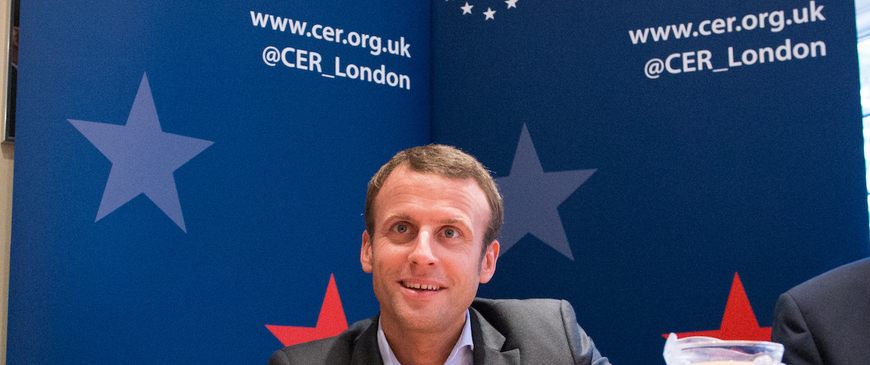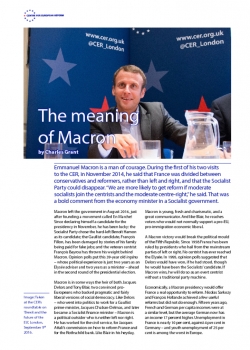
The meaning of Macron
The surge of support for Emmanuel Macron in France shows that liberal, pro-EU centrists may yet have a future in European politics. This would be good for the EU.
Emmanuel Macron is a man of courage. During the first of his two visits to the CER, in November 2014, he said that France was divided between conservatives and reformers, rather than left and right, and that the Socialist Party could disappear. "We are more likely to get reform if moderate socialists join the centrists and the moderate centre-right," he said. That was a bold comment from the economy minister in a Socialist government.
Macron left the government in August 2016, just after founding a movement called En Marche! Since declaring himself a candidate for the presidency in November, he has been lucky: the Socialist Party chose the hard-left Benoît Hamon as its candidate; the Gaullist candidate, François Fillon, has been damaged by stories of his family being paid for fake jobs; and the veteran centrist François Bayrou has thrown his weight behind Macron. Opinion polls put this 39-year old ingénu – whose political experience is just two years as an Elysée adviser and two years as a minister – ahead in the second round of the presidential election.
Macron is in some ways the heir of both Jacques Delors and Tony Blair, two convinced pro-Europeans who backed pragmatic and fairly liberal versions of social democracy. Like Delors – who went into politics to work for a Gaullist prime minister, Jacques Chaban-Delmas, and later became a Socialist finance minister – Macron is a political outsider who is neither left nor right. He has worked for the civil service, for Jacques Attali’s commission on how to reform France and for the Rothschild bank. Like Blair in his heyday, Macron is young, fresh and charismatic, and a great communicator. And like Blair, he reaches voters who would not normally support a pro-EU, pro-immigration economic liberal.
A Macron victory would break the political mould of the Fifth Republic. Since 1958 France has been ruled by presidents who hail from the mainstream parties of left or right. No centrist has ever reached the Elysée. In 1995, opinion polls suggested that Delors would have won, if he had stood, though he would have been the Socialists’ candidate. If Macron wins, he will do so as an overt centrist without a traditional party machine.
Economically, a #Macron presidency would offer France a real opportunity to reform
Economically, a Macron presidency would offer France a real opportunity to reform. Nicolas Sarkozy and François Hollande achieved a few useful reforms but did not do enough. Fifteen years ago, French and German per capita incomes were at a similar level, but the average German now has an income 17 percent higher. Unemployment in France is nearly 10 per cent, against 4 per cent in Germany – and youth unemployment of 25 per cent is among the worst in Europe.
This economic décrochage (uncoupling) between France and Germany – reinforced by Angela Merkel’s strength as a leader, and Hollande’s weakness – matters for the EU. German policy-makers have lost their trust in and respect for France’s rulers, and the Franco-German tandem, which once drove the EU forward, has lost momentum.
Macron wants reforms to both pep up France’s economy and strengthen his position in Europe. He wants to lower the state’s share of economic output from 55 percent of GDP – the highest in Europe – to 52 percent, and to respect the EU’s 3 percent budget deficit rule. But he also wants to invest €50 billion over five years on modernising the state and on training (especially for unemployed youths). He plans to give France a Nordic-style labour market, with active labour market policies and benefits dependent on participation in training programmes; collective bargaining decentralised from industry level to company level; and a reduction of taxes on employment.
The French president holds huge powers, so Macron should in theory be able to reform the country, if he wishes. But in practice, all presidents have found reform difficult to pull off. As Macron discovered when he was a minister, vested interests, trade unions and party activists are stubborn and conservative. He managed to liberalise coach services, shopping hours and the legal profession, but wanted to do much more.
Macron will need progress on reform in order to energise his EU strategy. Only if he can get the French economy growing more rapidly – while respecting EU budget rules – does he have a chance of persuading Germany to do two things: first, rebalance its economy by boosting investment, consumption and imports, thereby aiding the weaker members of the eurozone; and, second, back his plans for eurozone governance. He wants a eurozone budget, overseen by a eurozone parliament and managed by a eurozone finance minister.
If Macron makes some progress on structural reform and budgetary discipline, Berlin might agree to borrow and invest a bit more, and, possibly, buy some of his ideas for the eurozone. The problem is that Germany’s leaders will be reluctant to back domestic or European policies that run against the grain of traditional German economic thinking. German voters find the idea of a transfer union that subsidises supposedly profligate southern Europeans abhorrent. Germany’s Social Democrats are rather more open to French (and Anglo-Saxon) economic thinking than is Merkel, but even if they win office (see Christian Odendahl’s article in this bulletin) they will not be able to ignore the orthodox views of many Germans.
A #Macron presidency would revitalise the FR-GER tandem. GER doesn't like leading the EU on its own
But for all these difficulties, a Macron presidency would surely revitalise the Franco-German tandem. Germany does not like leading the EU on its own. In recent years France has been too weak to be a suitable partner and the UK has been distracted by Brexit. Meanwhile Italy, Spain and Poland have had neither the desire nor the capability to help Germany lead Europe. So Germany will jump at the chance of working with a France that has an energetic, pro-EU president, on issues such as defence, foreign policy and refugees.
Despite many links to the UK – the Financial Times and the Economist are among his cheer-leaders – Macron takes a hard line on Brexit. Like Hollande and Merkel, he does not want EU-phobes like Marine Le Pen to be able to profit from Brexit by demonstrating that a country can leave and then thrive. He believes that maintaining the strength and resilience of the EU is more important than maximising economic ties with the UK. But he is also keen to maintain close bilateral ties on defence and security.
Though opinion polls put Macron ahead of both Le Pen and Fillon, he will find the final weeks of the campaign gruelling. He has never before run for elected office. Russia’s media are recycling nasty rumours about his private life. Le Pen will do her best to portray Macron as a rich, out-of-touch, Brussels-loving, globalist banker. All his opponents will say – with some justification – that he is the candidate of the establishment of the now discredited Socialist Party.
This year, many lazy commentators have joined up the dots of Brexit, Trump and continental populists to predict the demise of liberalism, internationalism and the EU. A Macron victory would suggest they are wrong; political trends are seldom inevitable and strong individuals with convincing answers can break them. These days many voters care more about politicians’ personalities than policies. A lot of them liked Boris Johnson (a leader of Britain’s Leave campaign) and Donald Trump. Macron’s personality, and notably his charm, calm authority and courage – he is certainly brave to praise the EU repeatedly – may well appeal to more voters than Marine Le Pen’s simplistic remedies and bitterness.
Charles Grant is director of the Centre for European Reform.

